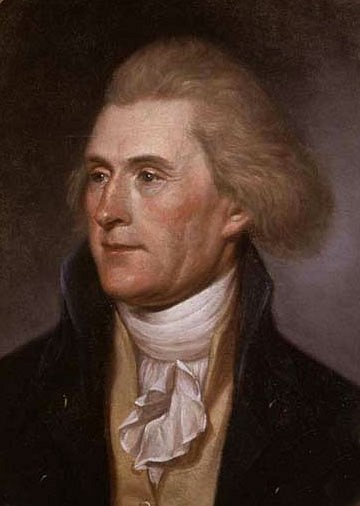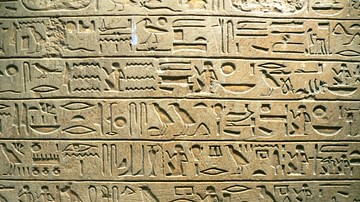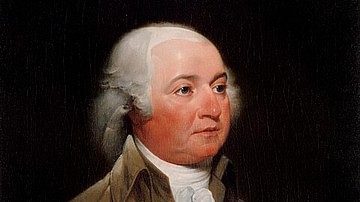Although Phillis Wheatley's poetry found an audience upon publication, it was not well received by everyone and some, notably Thomas Jefferson (l. 1743-1826), dismissed her work entirely as "mimicry" since, according to the prevailing understanding of the time, Blacks were incapable of the "higher thought" that was necessary in writing poetry.

There was no way a slave-holding society could recognize that Blacks were equal in every way to Whites while continuing to hold them in bondage. Many pseudo-scientific and religious justifications for slavery were widely circulated to 'prove' that Blacks were naturally inferior to Whites and, therefore, that slavery was ordained by God so that 'simple' Black people could be properly 'cared for' by their 'benevolent' White masters.
Phillis Wheatley (l. c. 1753-1784) challenged this belief, first in 1770 with a popular poem on the Reverend George Whitefield, and then with the publication of her Poems on Various Subjects, Religious and Moral, in 1773. Scholar Oscar Reiss comments:
The book was reviewed in England, and all reviewers were positive in their critiques. They were impressed with her knowledge of mythology and literature as well as her piety, with some writing that there was a need for new views about blacks' mental ability. The book was not considered a work of genius, but they were impressed that Phyllis had been introduced to the English language only 16 months earlier. It was a belief commonly held in England that "people born closer to the sun" were dull compared with those raised in cooler climates. Wheatley's work caused many Englishmen to take a second look at Africans.
(141)
However that may be, it did not have the same effect on Thomas Jefferson (later the third President of the United States, serving 1801-1809) who, as a British colonial from slave-holding Virginia, rejected Wheatley's work as nothing more than what one might expect of a child mimicking the words and behavior of an adult. Jefferson does not devote much space to Wheatley in his Notes on the State of Virginia (1785), but his dismissal of her work, along with his commentary on racial differences generally, encouraged later slaveholders to maintain and defend the inferiority of Blacks in the United States.
Wheatley's Rise to Fame
Phillis Wheatley (l. c. 1753-1784), an enslaved African American in Boston, first gained recognition in September 1770 through her poem On the Death of the Reverend Mr. George Whitefield, published as a broadside in Boston and then reprinted at least nine times in Boston, London, Newport (Rhode Island), New York, and Philadelphia. The poem celebrated the life and teachings of the famous evangelist George Whitefield (l. 1714-1770), a popular, if controversial, figure.
This poem is usually considered her first publication because an earlier poem of hers, On the Affray in King Street, on the Evening of 5 March – published in March 1770 and dealing with the Boston Massacre of 5 March 1770 – was unsigned. Wheatley, encouraged by the publication of her work, continued to write, bringing out Poems on Various Subjects in London in 1773.
The book included a letter from her master, John Wheatley, attesting to her authorship, as well as attestations from leading White Bostonians who had brought her to court in 1772 to question her on whether she had actually written the poems published under her name. Wheatley successfully defended her authorship, and the decision of the court informed the attestations.
As Reiss notes, the book was well-received by the British literary community, and once published in the North American Colonies, it was just as successful. Still, Poems on Various Subjects, even with its preface of attestations from respectable White gentlemen, could not convince everyone that a Black woman could write poetry, much less poetry of such depth and lyrical quality.
Jefferson's Criticism
Thomas Jefferson's criticism of Wheatley is well-known, appears frequently in most articles concerning her, and reads, in part:
Religion, indeed, has produced a Phillis Wheatley; but it could not produce a poet. The compositions published under her name are below the dignity of criticism.
(Notes on the State of Virginia, Query XIV; as cited in Waldstreicher, 307)
Here, Jefferson is referring to the critical approval of Wheatley's piety as evidenced in her work. Religious devotion, he suggests, might inspire some form of expression from a Black writer, but this cannot be considered 'poetry' since, in his view and that of many others, Blacks were incapable of producing such works. Scholar David Waldstreicher comments:
Wheatley takes up only a few lines at the center of Jefferson's lengthy defense of the Americans at their weakest point – as enslavers – but in a sense it is all about her, made necessary by her fame. She becomes key negative proof. If she is not a poet, if she is merely a pious parrot, if she is laughable, so is any depiction of Virginia or the United States as a weird tropical province unworthy of international engagement or support because of its barbarous slaving or its hypocrisy. The quickness of the dismissal is rhetorical, deliberately over the top, and essential to the dubious argument. Her poetry becomes merely religious to Jefferson in order to say it has neither classical nor modern virtues. Its relationship to genius is that of those who populate the mock-epic to real heroic subjects.
(307)
Notes on the State of Virginia was written in 1781 and 1783 but, as Waldstreicher notes, was not published in final form until 1785, a year after Wheatley's death, when she could no longer defend herself. The work significantly influenced European views of the United States at the time but, more importantly, provided later racialized writers with a paradigm of argument in favor of slavery and the racial superiority of Whites.

Echoes, and sometimes direct paraphrasing, of Jefferson's lines on the supremacy of Whites appear in T. R. Dew's A Review of the Debate in the Virginia Legislature of 1831 and 1832, written by Thomas Roderick Dew (l. 1802-1846), then a professor history and political law at The College of William & Mary in Williamsburg, Virginia, in response to the legislature's consideration of emancipation of the state's slaves following Nat Turner's Rebellion of August 1831. Dew's work ended all debate on the emancipation of slaves in Virginia, and the institution would continue until it was abolished by the Thirteenth Amendment in 1865.
Wheatley does not appear in Dew's work, but Jefferson's line of argument informs the entire piece. Jefferson was actually opposed to slavery and considered it a wasteful practice, but this was simply in terms of economics, not on moral grounds. The author of The Declaration of Independence never meant that "all men are created equal," but only those who looked like him and were of the same social status. Wheatley's poetry challenged Jefferson's core beliefs on race – widely held at the time – and so was a threat that had to be neutralized.
Today, Jefferson's Notes on the State of Virginia is regularly dismissed by scholars as a racist sales pitch to European nations, hoping to win their respect, while Phillis Wheatley's work is highly regarded, and she is recognized as among the greatest poets in US history.
Poems
The following works are taken from Poems on Various Subjects, Religious and Moral (1773) as published in Phillis Wheatley, Complete Writings, edited and with and introduction by Vincent Carretta (2001) except for Reply to the Constitution which is given in The Odyssey of Phillis Wheatley: A Poet's Journey Through American Slavery and Independence (2024) by David Waldstreicher.
The first three below – On the Death of the Reverend Mr. George Whitefield, On Being Brought from Africa to America, and To S.M a Young African Painter, On Seeing His Works – are well-known and often anthologized. To S.M. is thought to have been written for the artist Scipio Moorhead (active 1773-1775), who created the famous frontspiece for Poems on Various Subjects.

Reply to the Constitution is among those works 'tentatively attributed' to Wheatley because, although clearly written in her style and with her same penchant for literary allusion, they were published unsigned.
Reply to the Constitution has nothing to do with the Constitution of the United States but with a poem, The Constitution, published by an anonymous writer in the Independent Chronicle of Boston in 1778. The Constitution, written in response to suggestions that the Massachusetts Constitution outlaw slavery, argued in favor of its continuance as well as maintaining class and racial barriers. Wheatley's response, also published anonymously that same year, challenges these claims and is also among her most direct condemnations of the institution of slavery.
On the Death of the Reverend Mr. George Whitefield
Hail, happy saint, on thine immortal throne,
Possest of glory, life, and bliss unknown;
We hear no more the music of thy tongue,
Thy wonted auditories cease to throng.
Thy sermons in uneuall'd accents flow'd,
And ev'ry bosom with devotion glow'd;
Thou didst in strains of eloquence refin'd
Inflame the heart, and captivate the mind.
Unhappy we the setting sun deplore,
So glorious once, but ah! It shines no more.
Behold the prophet in his tow'ring flight!
He leaves the earth for heav'n's unmeasur'd height,
And worlds unknown receive him from our sight.
There Whitefield wings with rapid course his way,
And sails to Zion through bast seas of day.
Thy pray'rs, great saint, and thine incessant cries
Have pierc'd the bosom of thy native skies.
Thou moon has seen, and all the stars of light,
How he has wrestled with his God by night,
He pray'd that grace in ev'ry heart might dwell,
He long'd to see America excel;
He charg'd its youth that ev'ry grace divine
Should with full lustre in their conduct shine,
That Saviour, which his soul did first receive,
The greatest gift that ev'n a God can give,
He freely offer'd to the num'rous throng,
That on his lips with list'ning pleasure hung.
"Take him, ye wretched, for your only good,
"Take him ye starving sinners, for your food;
"Ye thirsty, come to his life-giving stream,
"Ye preachers, take him for your joyful theme;
"Take him my dear Americans, he said,
"Be your complaints on his kind bosom laid:
"Take him, ye Africans, he longs for you,
"Impartial Saviour is his title due:
"Wash'd in the fountain of redeeming blood,
"You shall be sons, and kings, and priests to God."
Great countess, we Americans revere
Thy name, and mingle in thy grief sincere;
New England deeply feels, the Orphans mourn,
Their more than father will no more return.
But, though arrested by the hand of death,
Whitefield no more exerts his lab'ring breath,
Yet let us view him in th' eternal skies,
Let ev'ry heart to this bright vision rise;
While the tomb safe retains its sacred trust,
Till life divine re-animates his dust.
On Being Brought from Africa to America
`Twas mercy brought me from my Pagan land,
Taught my benighted soul to understand
That there's a God, that there's a Saviour too:
Once I redemption neither sought nor knew.
Some view our sable race with scornful eye,
"Their colour is a diabolic die."
Remember, Christians, Negros black as Cain,
May be refin'd, and join th' angelic train.
To S.M. a Young African Painter, On Seeing His Works
To show the lab'ring bosom's deep intent,
And thought in living characters to paint,
When first thy pencil did those beauties give,
And breathing figures learnt from thee to live,
How did those prospects give my soul delight,
A new creation rushing on my sight?
Still, wond'rous youth! Each noble path pursue,
On deathless glories fix thine ardent view:
Still may the painter's and poet's fire
To aid thy pencil, and thy verse conspire!
And may the charms of each seraphic theme
Conduct thy footsteps to immortal fame!
High to the blissful wonders of the skies
Elate thy soul, and raise thy wishful eyes.
Thrice happy, when exalted to survey
That splendid city, crown'd with endless day,
Whose twice six gates on radiant hinges ring:
Celestial Salem blooms in endless spring.
Calm and serene thy moments glide along,
And may the muse inspire each future song!
Still, with the sweets of contemplation bless'd,
May peace with balmy wings your soul invest!
But when these shades of time are chas'd away,
And darkness ends in everlasting day,
On what seraphic pinions shall we move,
And view the landscapes in the realms above?
There shall thy tongue in heav'nly transport glow:
No more to tell of Damon's tender sighs,
Or rising radiance of Aurora's eyes,
For nobler themes demand a nobler strain,
And purer language on th' ethereal plain.
Cease, gentle muse! The solemn gloom of night
Now seals the fair creation from my sight.
Reply to the Constitution
The wisest of mankind has said,
Let answer to a fool be made; -
Lest fancy fond oppress with weight,
Of wisdom in his own conceit; -
But yet again, "Response deny,
And pass the low-lived scandal by;
Lest semblance of his ways appear,
(By virtue seen)with grief sincere."
Shall we inequal strains return
Thy spleen, and answer scorn with scorn? –
Thy rancour rages unconfin'd,
Thy rancour more than love is blind;
This prejudice's in favour spies,
No failing in its darling prize; -
But, that, with boundless fury grows,
Promiscuous wreak'd on friends and foes.
Say why this insult and disgrace –
So freely thrown on Afric's race;
Or shall we, wondrous author! Own,
That insult can from thee be thrown?
Our different hue tho' nature gave,
Does colour constitute the slave?
For that can man of sense despise?
For thee can want of virtue rise?
What barrier can that race divide,
But in thy ignorance and pride?
The sole distinction nature made,
In good, and ill, alone display'd.
To limit they abandon'd rage,
Once more, peruse the sacred page.
The slave is he, whom passion sways;
Mean slave? Who envy's voice obeys; -
More sable far, his mental hue,
Who bids fair virtues path adieu; -
But say, since thus ingrateful sound,
For what you cross'd the seas profound?
The wisdom absolute, should keep,
That barrier true, the roaring deep.
Each Afric would well pleas'd remain,
And cultivate his native plain;
Wou'd view around the rural scene,
All beauteous in eternal green.
Each generous Afric's bosom burns,
And thy malignant sentence scorns;
When in insulting strain you dare,
With scandal touch Columbia's fair; -
Shall thy mean insolents of tongue,
Thus charge the generous Court with wrong?
Say, why should jealous fury rise,
And flash from thine indignant eyes;
When kindly set from bondage free,
How gives their freedom pain to thee?
When freedom Goddess-like displays
Her banner – joyful nations gaze?
And ardent throng around her feet;
The heart with gratitude replete; -
Nor does the Queen disdain to hear,
The suit her sable sons profer;
But gracious, with a smile divine –
Assents, and frees the injur'd line.
We smile contempt at thy ill-nature,
Express'd in low, promiscuous satire.
Since fearful to remain unknown,
You'd have this monumental stone.
"A while did this great Bard display,
His glow worm momentary ray;
Then sunk profound for endless sleep,
In dark oblivion's sable deep."





